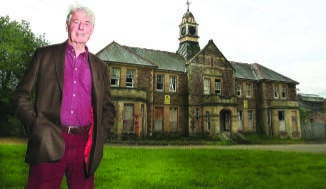Rudolf Hess: The ‘Kaiser of Abergavenny’ - the truth about his treatment and recovery at the Welsh asylum
Rudolf Hess, Deputy
Führer to Hitler, made a famous escape to
He subsequently spent time in
According to the book, Hess has a lot of free time and was known locally as ‘The Kaiser of Abergavenny’. The author Hugh Purcell said:
“I have found the diary of a
visiting doctor from the War Office who wrote on 25 June 1942 “Hess seems to be
here in Talgarth, but one is not to know it. He has
At the end of the Second World War, Hess was returned to
The story of Hitler’s deputy is
only one of many in the history of the Mid Wales asylum which feature in the
book Up Top by Hugh Purcell with his
wife Margaret Percy. The work is based on interviews with many of the former
staff and patients as well as research into archive materials found in both
Powys and
The Mid Wales opened as an asylum for Brecon and Radnorshire in 1903. Its area widened to include Montgomeryshire in 1921 and it was rebranded as a hospital treating the mentally ill. Most of its patients were long term patients remaining at the institution until their deaths. Around a thousand patients who died at the Mid Wales are buried within the grounds in unmarked graves.
Treatment and care for common cases included mothers of illegitimate children who were sent to the asylum under the Moral Imbecility Act of 1913, including twin sisters who were sent there as one had borne an illegitimate child, whilst the other was simply her sister; shell-shocked soldiers from the Great War who were still at the Mid Wales in the 1950s; a teenage boy who was caught ‘flashing’ at Talgarth market before the Great War, and who remained a patient until the 1970s; many so-called ‘mental defectives’, who were often the result of incest and in-breeding.
There were also many patients who remained there due to previous treatments for mental illness, such as those who were given frontal leucotomy brain surgery at the Mid Wales during the late 1940s and lived to see the end of the 1970s.
With the introduction of the NHS, the Mid Wales’ catchment area spread to the whole of Powys, which it served until its closure in 2000.
Up Top describes what life was like in the asylum in the early
days, during the second world war when the Mid Wales was the only mental
hospital in the
